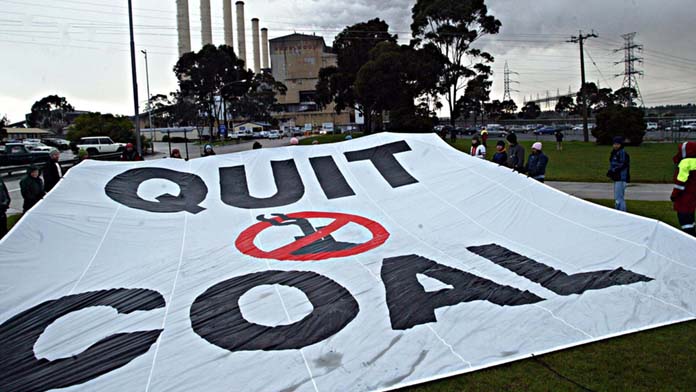Amid the myriad accounts of climate breakdown recently, an article from The Saturday Paper presented what seemed a positive, inspiring story of energy workers “climate quitting” (perhaps a cousin of quiet quitting) as a form of dissent and expression of concern about the complicity of their employers in the climate crisis.
Individuals recount their resignations stemming from a realisation that their employers engaged in dodgy environmental practices and were not planning to do anything about it. The article’s author describes such phenomena as “part of a profound moral awakening”.
After realising they could not effect change internally through their attempts to reason with people (for example, by raising the issue with other staff through internal messaging boards), they chose a different path of “personal culpability”: refusing to be complicit in those companies’ ecologically damaging actions and walking away from their jobs to do other work.
While the gesture of quitting is symbolically powerful, has personal appeal (akin to giving the middle finger) and is a credit to those people’s principles and values, unfortunately it is not a politically effective tactic for one simple reason: the employers don’t care. On the contrary, polluting companies are on a constant mission to avoid existing regulations with tricky accounting and slippery legal manipulations.
Climate quitting mostly adds to the list of already existing, individual-level (or small group-level) actions that energy corporations can and will ignore. For all its symbolic power, it is highly unlikely that a few people quitting on an individual level will do anything to hurt the industry.
It’s telling that the examples in The Saturday Paper all involved highly paid professionals who could easily find another job, or where, in one case, the “exit strategy was to do a PhD”.
The majority of people either cannot or will not choose to quit. Their jobs are their bread and butter.
Such stories, in the bigger picture, are a variation on the theme of consumer activism, where individuals are encouraged to be green spenders (or by some arguments, reduce their spending altogether) as a means of encouraging greener capitalism.
All these kinds of individual or small-group actions, even the high-profile or extreme, disruptive ones, meet their limits when, after all is said and done, the capitalist machine keeps on running.
The good news is that there is a tried and tested tactic for forcing the hand of the powerful that involves neither blaming those who are having their first experience of smokey skies nor relying on people to self-sacrifice and quit their jobs.
It too requires personal cost and risk, but unlike the consequences for those taking smaller-scale actions, the risk is distributed across larger numbers, and the burden shared. Better still, employers cannot ignore it.
Workplace industrial action.
Workplace action can take many forms.
Actions can include demanding protective gear to mitigate the immediate health effects of the climate crisis, such as those currently being experienced in Canada and the US. Several unions in the US, from those that represent delivery drivers to those representing hospitality workers, have organised to distribute N95 masks for this purpose.
It can also mean stopping work entirely if the effects of a climate-related event are severe enough. Sydney wharfies stopped work in January 2020 when the air was filled with dangerous levels of smoke from bushfires. This was made possible by the Workplace Health and Safety Act and put into action by health and safety representatives in the Maritime Union of Australia (MUA).
Such actions rarely take place without resistance from employers. Two companies in Port Botany threatened members in the above case with fines for taking illegal industrial action.
Under current industrial laws in Australia, other than during a very limited period every few years, striking is difficult—near impossible, in fact, without swift punishment, from management pressure to fines. What this means is that workers who build up the confidence to take industrial action will be pushed in the direction of a form of civil disobedience, another way of saying “break the law”.
Workplace actions can additionally take the more modest form of position statements in unions about the bigger climate crisis. During the smoke-related stoppage, the MUA took the opportunity to overtly link “catastrophic climate change” to daily issues like the health and safety of workers.
Such statements can lead to solidarity actions from all kinds of workers from all kinds of jobs. Everyone can strike for climate, just as school children and adult allies have done in recent years. After all, it is a matter of survival on a global level and concerns everyone.
Climate activists are no strangers to breaking the law for the greater good. This principle should be extended to the workplace, where widespread (preferably majority) involvement and support should be built up.
This is ultimately the direction that non-violent, civil disobedience has to take if the climate and other related causes (such as elimination of war and universal human flourishing) are to succeed.
Individuals or small groups of individuals are rarely troubling to employers. A mass movement of striking workers, on the other hand, is a formidable force. Climate quitting is a strategy that can suit those with the means or ability to find something else. But it may be more effective to stay and encourage everyone—including those who cannot afford to quit—to join the fight.
By Tami Gadir






